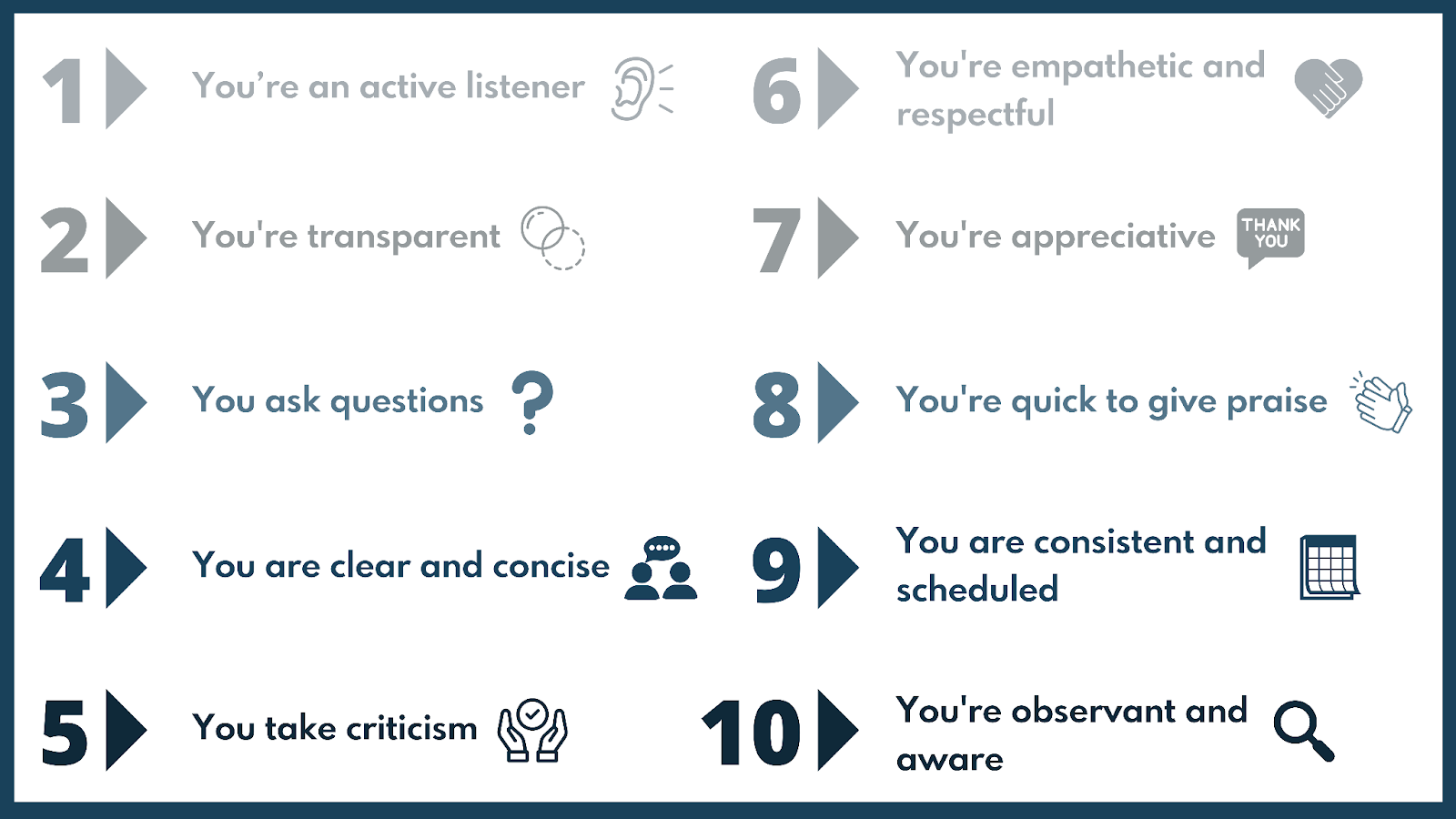The act of delivering or exchanging information is the basic definition of communication. Because information delivery and exchange are so critical in every industry, communication is key to the success of almost every company, and business leaders worldwide must assume responsibility for guiding communication within their organizations.

As a leader, you must be an effective communicator. Communication is key to defining a team’s morale, drive, sense of purpose, productivity and everyday interactions. As the leader you set the tone for all of that, and you do it with your leadership communication skills.
In this blog post, we will examine the characteristics of effective communication and how your team’s output is a direct reflection on your professional communication skills. Read on to learn more.
Communication is Key in the Workplace
If you’re like most business leaders, you’re hoping to improve productivity, build trust with your employees and reduce unnecessary costs to your business. Communication is key to all of that. If you’re not convinced, all you have to do is look at the numbers.
For example, implementing effective communication in your workplace could drive your team’s productivity to increase by up to 25%, according to a report from McKinsey, and as an added bonus, you’ll increase trust with your team. Also, according to a report from Lexicon, more than 80% of American workers believe that regular communication with employees is critical to building trust with them.
On the flip side of those positive statistics, if you fail to communicate effectively, you risk real monetary impacts to your business. A Holmes report placed the cost of ineffective communication to businesses across industries at $37 billion annually. And a separate report from David Grossman identified upwards of a $62.4 million-per-year loss for businesses with poor communication.
Gauging if You are an Effective Communicator
We all know communication is key, but how do you gauge if you are an effective communicator? The answer to that question will tell you a lot about your business and the areas of improvement you may have. Below, we examine signs that your professional communication skills are on point and signs that they may need some improvement.

Signs You are an Effective Communicator
The following are 10 characteristics of effective communication. If you have these characteristics, you are likely an effective communicator.
1. You’re an active listener. You don’t talk at your team; you talk with them. And when they’re speaking to you, you are showing them that you are paying attention to what they’re saying rather than waiting for your next opportunity to talk.
2. You’re transparent. You don’t beat around the bush — you tell the truth at all times, and you don’t hide anything from your team.
3. You ask questions. When your team begins a new project, you don’t just wait for the report; you get involved and ask questions early on and throughout the process so you have a complete understanding and can support them when needed.
4. You are clear and concise. One of the most important components of effective communication is the ability to say a lot with a little. You don’t talk in circles — you say precisely what you mean in as few words as possible.
5. You take criticism.
6. You’re empathetic and respectful. Empathy is one of the critical components of emotional intelligence, which in itself is a key workplace communication tool. You try to understand your employees’ challenges from the ground level and respectfully help them through to a workable solution.
7. You’re appreciative. You feel true appreciation when your team accomplishes something. You don’t just appreciate the effect of the accomplishment, but the hard work that went into it.
8. You’re quick to give praise. You don’t keep your appreciation to yourself. You communicate praise early and often to keep employees motivated and let them know when they are doing something right.
9. You are consistent and scheduled. Being an erratic leader means being an ineffective leader. How you portion out your day communicates how your employees should prioritize their own work hours, meaning your schedule is a communication tool.
10. You’re observant and aware. You don’t let the big picture get in the way of the details. You devote the time and effort necessary to observe your team’s performance and stay aware of both their challenges and successes.
Signs You are Not an Effective Communicator
Each of the above characteristics of effective communication has an opposite, and that opposite can harm your performance as a leader and your workplace as a whole. Here are the signs you are not an effective communicator:
1. You are uncomfortable giving feedback. For leaders, feedback is a key form of communication — whether it is positive or negative. If you’re not comfortable delivering feedback, your communication is lacking.
2. You do too much at once. Taking on too many tasks or projects at once is not a sign that you are amazing at your job — it communicates to your team that you don’t know how to prioritize tasks appropriately, and it sets a tone for your employees to have the same problem.
3. You are inconsistent. If you’re all in on Monday but tuned out by Friday, you’re inconsistent, and you have a communication problem. Your employees need to be consistent in their own work efforts, but your behavior is communicating to them that those who have risen to the top have not had to be consistent.
4. You shut down ideas. Shutting down ideas never gives off a good message. Even if the idea is obviously not good, if you shut it down without hearing it in full, you are not effectively communicating the core problem with the idea.
5. You assume. Implying and making assumptions are two forms of bad professional communication. Instead of jumping to conclusions, listen actively to truly understand what your team members are saying.
6. You’re self-centered. If you’re self-centered and not putting the team first, it shows. If your team sees this trait in you as a leader, they will not fully trust you the next time it really counts, no matter how good your communication skills are.
7. You’re overly emotional. This is business, and while it’s OK to show some emotion in your communications with your team, you need to avoid letting emotions cloud your judgment.. At the end of the day, staying calm and collected even in the face of adversity wins the day.
8. You don’t ask questions. Not asking questions means you’re not getting the full picture. And without the full picture, you can’t be an effective communicator.
9. You have unrealistic expectations. You need to communicate your expectations clearly, and they need to be realistic. Don’t ask for perfection overnight, and don’t expect your team members to understand benchmarks and goals you haven’t explicitly taken time to communicate to them.
10. You don’t give public praise. Forgetting to publicly praise your employees is a failure in communication. Recognition is one of the key motivators of successful teams.
Strong communication is key to a successful workplace, so if you see any of these 10 signs of ineffective communication in your own leadership style, it doesn’t necessarily mean you are a poor leader but take it as a sign to better yourself as an effective communicator.
How to be a More Effective Communicator
Did you find that you had some of the characteristics of an ineffective communicator? It’s OK — no leader is perfect, but good leaders are always striving to be better. I wrote in my book, “The Power of Proven Results,” one of our core values at Hartman is recognizing that “the growth and development of people is the highest calling of leadership.” We believe the building blocks of effective communication are already present in all companies — we just have to “develop our most appreciable asset: our people.”
By focusing on your people, you can identify weaknesses in the communication styles of your workplace and develop them according to the components of effective communication discussed earlier in this article.
From there, it’s a matter of getting the whole team on board. Leaders find a way to win by creating buy-in from staff and creating momentum in the organization. And once you have created organizational momentum moving in the direction of effective professional communication, it’s just a matter of staying focused on the ultimate goal and keeping the ball rolling.

How to Better Communicate with Your Team
How you communicate with your team sets the tone for communication throughout your organization. That means improvements in how you communicate with your team will improve communication throughout your company.
The first thing to remember here is that communication is so much more than face-to-face conversations. We communicate through email, video calls, text messages and more. With that in mind, take a hard look at your own communication practices with your team; read back through some recent emails or text messages, or even record a Zoom meeting and play it back. Look for the following factors, and if you identify them, correct them to be a more effective communicator:
- Over-communication to the point that your team members feel they lack autonomy
- Long or rambling messages
- Instances in which your tone or manners are lacking
- Typos that suggest you don’t care about the message at hand or lack professionalism
Those are classic signs of a communication problem that transcends face-to-face communication. And if you have remote team members, addressing these concerns is at least doubly important. Because so many workplaces now have at least some remote workers, it’s important to understand that communication with someone who is working from home is different from communication with someone who is working down the hall.
With that in mind, I recommend the following for better communication with remote workers:
- Prioritize video calls over audio-only calls.
- Schedule brief daily team meetings.
- Communicate proactively, not reactively.
- Do not check in on task progress too frequently. In other words, avoid micromanaging.
- Ask remote team members about their own communication preferences and try to implement them to an appropriate degree.
Communication is Key to Your Company’s Success
No matter the work environment, number of team members you employ or the amount of time in the day you have, being an effective communicator should be one of your highest priorities. Communication is key to a healthy workplace — promote effective communication, and you will see a boost in productivity, morale, sense of purpose, engagement, growth, and trust10.
To learn more about leadership and communication in the workplace, please follow Al Hartman on Twitter and LinkedIn.





